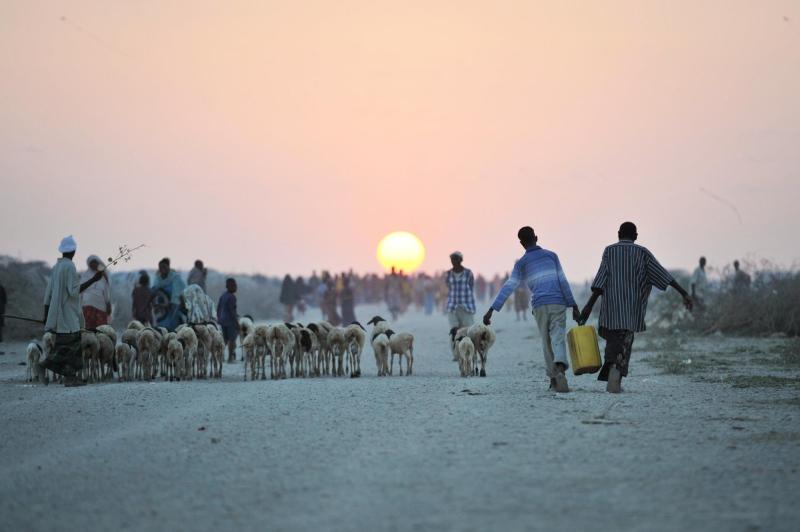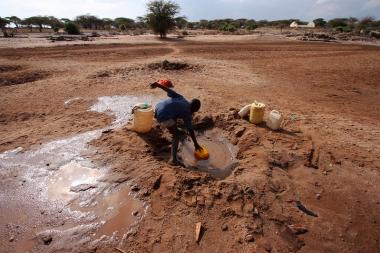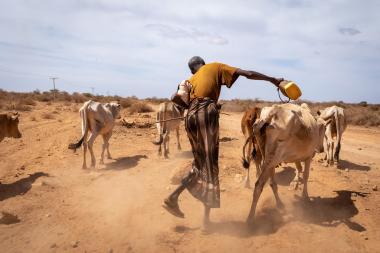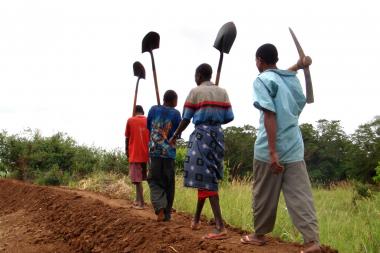Blog
Community-led early warning and anticipatory action in Somalia
Somalia is in a severe crisis that has built up over four failed rainy seasons. How are communities anticipating these shocks and how can we work with them to better integrate anticipatory action?
Publisher SPARC
Researchers from SPARC and the Building Resilient Communities in Somalia (BRCiS) consortium highlighted how pastoralist and agropastoralist communities in Somalia have been using community networks to deliver early warnings, and are taking action in anticipation of shocks, during a recent event on “Community-led early warning and anticipatory action in Somalia” at the 5th Africa Dialogue Platform for Anticipatory Humanitarian Action.
Over time, Somali farmers and pastoralists have developed an understanding of the natural hazards and climatic circumstances they encounter at any given moment. Communities have extremely robust information-sharing networks, which support them to share warning messages, for example people upstream warning those downstream of rising water levels and likely upcoming flooding downstream. These informal early warning systems allow people to be extremely well connected.
However, as recent SPARC research indicates, access to - and use of - official seasonal forecasts is much more limited. There are also signs that it is becoming increasingly difficult to predict seasonal climate and weather patterns based on past observations.
“People rely heavily on elders to make forecasts about the future season using traditional methods of weather forecasting. However, this method of predicting is getting more difficult as climate change renders weather patterns less predictable.”
Muzzamil Abdi Sheikh, a researcher at SPARC/Mercy Corps.
Barriers to anticipatory action
Government agencies in Somalia are forecasting and alerting communities of upcoming events, but the capacity of the meteorological department is not as strong as in other countries, and more communication is needed between the government and local populations. Community networks and widespread access to mobile phones and social media in Somalia provide great potential for the government and partners to tap into, to co-produce and deliver relevant early warning services.
However, even with improved access to information, panellists at the event highlighted a number of constraints that prevent people - individually and in community - from taking anticipatory action:
First, in times of drought distress, pastoralists have to make difficult decisions about whether to stay where they are and wait for the next rains, or to move with animals in search of pasture and water risking that some weakened animals die on the way. People in this situation are already living on the edge, with limited options and important trade-offs to consider. Over time, shock after shock erodes their existing capacity.
“We really need to understand people’s dilemmas and constraints, need to be open minded with our questions, and listen to what people are saying and what their priorities are.”
Simon Levine, Senior Research Fellow at SPARC/ ODI.
Second, finance can be a constraint to timely action - not just in volume - but also importantly in terms of flexibility. Community needs and expectations during crises likes this are high, yet they can struggle to access resources and local government has limited capacity to respond, or to take the lead in high magnitude crisis, with more reliance on external assistance.
Third, security remains a major issue for access. Some of the communities most vulnerable to drought impacts live in areas that are hard to reach, which constrains quick delivery of assistance, including in anticipation of shocks. In the worst case, encouraging communities to take collective action at the local level may expose people to greater security risks.
Lastly, shocks can weaken social fabric and hinder community-led anticipatory action. Some families are separated because of shocks. There is also vast rural-to-urban migration. Many people are fleeing drought or floods, including leaving areas controlled by Al-Shabab, and seeking alternative livelihoods or humanitarian relief in towns and camps for Internally Displaced People. This mass movement of people impacts the social support system. Covid-19 has also been a significant challenge, negatively impacting livestock markets, remittances and employment opportunities, for example, in urban construction. The pandemic also made it more difficult for people to come together to perform communal tasks.
Flexibility in programming and budgeting can support community-led partnerships to strengthen anticipatory action
Despite these challenges, communities and Non-Governmental Organisations are working together to enable community-led anticipatory action, for example, through the BRCiS Consortium. Communities already have in-depth knowledge of shocks and ways to mitigate them, which the consortium supports in monitoring and addressing these shocks more systematically.
“The first step is the community - they define the shocks, what they can do, and what external support they require. We have seen a lot of engagement from communities and their lead in anticipatory action. The involvement of local government has also been critical in the process.”
Abdulkadir Ibrahim, Resilience Programme Co-ordinator at Concern Worldwide/BRCiS.
Having a contingency for anticipatory action and flexibility - for example through scalable safety nets within the longer-term resilience programme - has been key. Finally, having an adaptive and flexible budget is vital as it allows reprogramming when communities see a shock coming, to reduce the magnitude of the shock later on. Strong community-engagement from the start also helps organisations to understand what communities need to do and when, building on the strategies that people are trying to implement.
Discussions at the event, which was hosted by the Intergovernmental Authority on Development (IGAD) Climate Predictions and Applications Centre (ICPAC) on 29 June in Nairobi, placed the spotlight on the need to connect early warning systems - and the anticipatory actions they enable - from local to national level, and between formal and informal systems. This means communities and organisations working at the local level must engage with and be involved in formal policies and processes such as the National Disaster Risk Reduction Strategy enacted by Parliament, and multi-hazard early warning systems run at state level.
“The work that is being done at the community level is really essential, (…) but there really needs to be a connectivity between the community-level and the government systems, for example, through the National Climate Outlook Forum held each year after the [regional] Greater Horn of Africa Climate Outlook Forum. So we need to get together to define thresholds to set triggers that reflect the context we are talking about.”
Khadar Sheikh Mohamed, Director of the Department for Disaster Risk Reduction, Ministry of Humanitarian Affairs and Disaster Management (MoHADM), Federal Republic of Somalia.
Panellists and audience members all stressed the importance of integrating anticipatory action within existing processes to link early warnings more systematically with actions. It is not about replacing a system or creating separate anticipatory action projects, but about expanding on what is already there - within communities and at local and national government level.

Two young boys carrying water walk down a road next to an IDP camp near the town of Jowhar, Somalia
Credit Image by Tobin Jones/AMISOM/AU UN - CC0 1.0


